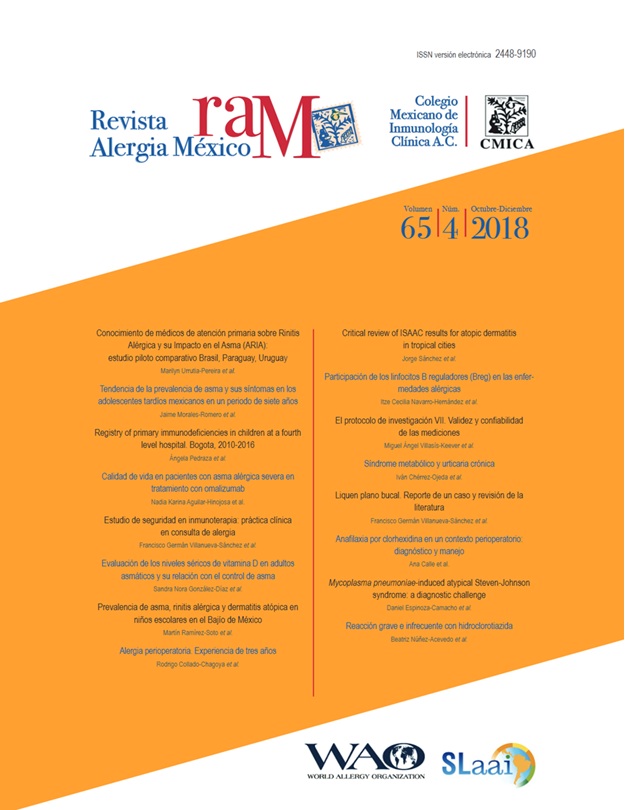Abstract
Background: Immunotherapy with specific allergens is the only immune system-modifying treatment for allergic disease.
Objective: To identify the prevalence of adverse reactions during the subcutaneous immunotherapy initiation phase in real-life conditions and possible associated risk factors.
Methods: One-year retrospective, observational study. Epidemiological characteristics of 481 patients, type of immunotherapy used and adverse reactions were recorded.
Results: 16.8% of patients suffered atopic dermatitis, 8.9% food allergy, 4% drug allergy and 7.3 % had experienced idiopathic urticaria. Grass pollen was the main allergen. In polysensitized patients, the use of polymerized extracts that contained grasses in their composition was higher (89.2%) than that of native extracts (78.9%). A total of 1292 doses of specific immunotherapy were administered: 881 polymerized extracts and 411 depot extracts; 30 patients had an adverse reaction (6.2 %): 4.4% of those who received polymerized extract and 14.3 % of those who received a native one (OR = 3.657). In patients who received polymerized extracts, the adverse reaction was local in 82.4%, mild systemic in 11.8% and only in one it was serious systemic; 66.7 % of those who received native extract had local reactions, 25 % mild systemic and only one, serious systemic.
Conclusion: Subcutaneous immunotherapy under real life conditions is not free of risk, but the incidence of severe reactions is very low, especially with polymerized extracts, even when grouped or ultra-rapid testing is used.
References
Domínguez-Ortega J, Delgado J, Blanco C, Prieto L, Cimarra M, Henríquez-Sanrana A, et al. Specific allergen immunotherapy for the treatment of allergic asthma: a review of current evidence. J Investig Allergol Clin Immunol. 2017;27(Suppl. 1):1-35. DOI: 10.18176/jiaci.0149
Asamoah F, Kakourou A, Dhami S, Lau S, Agache I, Muraro A, et al. Allergen immunotherapy for allergic asthma: a systematic overview of systematic reviews. Clin Transl Allergy. 2017;7:25. DOI: 10.1186/s13601-017-0160-0
Jutel M, Agache I, Bonini S, Burks AW, Calderon M, Canonica W, et al. International Consensus On (ICON) Allergy Immunotherapy (AIT). J Allergy Clin Immunol. 2015;136(3):556-568. Disponible en: https://www.eaaci.org/documents/EAACI-ICON-AIT.pdf
Casanovas M, Martín R, Jiménez C, Caballero R, Fernández-Caldas E. Safety of immunotherapy with therapeutic vaccines containing depigmented and polymerized allergen extracts. Clin Exp Allergy. 2007;37(3):434-440. DOI: 10.1111/j.1365-2222.2007.02667.x
Bousquet J, Michel FB. Safety considerations in assessing the role of immunotherapy in allergic disorders. Drug Saf. 1994;10(1):5-17. DOI: 10.2165/00002018-199410010-00002
Nettis E, Giordano D, Ferrannini A, Tursi A. Systemic reactions to allergen immunotherapy: a review of the literature. Immunopharmacol Immunotoxicol. 2003;25(1):1-11. DOI: 10.1081/IPH-120018279
Serrano P, Justicia JL, Sánchez C, Cimarra M, Fernández-Távora L, Orovitg A, et al. Systemic tolerability of specific subcutaneous immunotherapy with index-of-reactivity-standardized allergen extracts administered using clustered regimens: a retrospective, observational, multicenter study. Ann Allergy Asthma Immunol. 2009;102(3):247-252. DOI: 10.1016/S1081-1206(10)60088-9.
Cox L. Accelerated immunotherapy schedules: review of efficacy and safety. Ann Allergy Asthma Immunol. 2006;97(2):126-137. DOI: 10.1016/S1081-1206(10)60003-8
Valero A, Quirce S, Dávila I, Delgado J, Domínguez-Ortega J. Allergic respiratory disease: Different allergens, different symptoms. Allergy 2017; 72:1306-1316.
Calderón MA, Vidal C, Rodríguez-Del Río P, Just J, Pfaar O, Tabar AI, et al. European Survey on Adverse Systemic Reactions in Allergen Immunotherapy (EASSI): a real-life clinical assessment. Allergy 2017;72(3):462-472. DOI: 10.1111/all.13066

This work is licensed under a Creative Commons Attribution-NonCommercial 4.0 International License.
Copyright (c) 2018 Revista Alergia México

